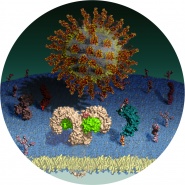Difference between revisions of "Main Page"
Jump to navigation
Jump to search
(PyMOL v2.0) |
|||
| (3 intermediate revisions by 3 users not shown) | |||
| Line 1: | Line 1: | ||
__NOTOC__ | __NOTOC__ | ||
{| align="center" width="100%" style="background: #B22222; margin-bottom: 4em; border-bottom: 1px solid #B22222; border-left: 1px solid #B22222; border-right: 1px solid #B22222;" | {| align="center" width="100%" style="background: #B22222; margin-bottom: 4em; border-bottom: 1px solid #B22222; border-left: 1px solid #B22222; border-right: 1px solid #B22222;" | ||
| − | |+ style="font-size: 1.0em; font-weight: normal; color: #FFFFFF; text-align:right; background: #B22222; padding-top:0.5em; padding-bottom: 0.25em; padding-right: 0. | + | |+ style="font-size: 1.0em; font-weight: normal; color: #FFFFFF; text-align:right; background: #B22222; padding-top:0.5em; padding-bottom: 0.25em; padding-right: 0.60em; border-top: 2px solid #B22222; border-bottom: 1px solid #fff;" |hosted by [[File:SBGridlogo2.jpg|140 px|link=https://sbgrid.org/]] |
|} | |} | ||
{| align="center" style="padding-bottom: 3em;" | {| align="center" style="padding-bottom: 3em;" | ||
| Line 28: | Line 28: | ||
{| class="jtable" style="float: left; width: 90%;" | {| class="jtable" style="float: left; width: 90%;" | ||
|+ style="font-size: 1.4em; font-weight: bold; text-align:left; border-bottom: 2px solid #6678b1;" | News & Updates | |+ style="font-size: 1.4em; font-weight: bold; text-align:left; border-bottom: 2px solid #6678b1;" | News & Updates | ||
| + | |- | ||
| + | ! Official Release | ||
| + | | [https://pymol.org PyMOL v2.0 has been released] on September 20, 2017. | ||
| + | |- | ||
| + | ! Plugin Update | ||
| + | | [[MOLE 2.0: advanced approach for analysis of biomacromolecular channels|MOLE 2.5]] is an updated version of channel analysis software in PyMOL | ||
| + | |- | ||
| + | ! Official Release | ||
| + | | [http://pymol.org PyMOL v1.8.6 has been released] on March 9, 2017. | ||
|- | |- | ||
! Official Release | ! Official Release | ||
Revision as of 14:20, 20 September 2017
| The community-run support site for the PyMOL molecular viewer. |
| To request a new account, email SBGrid at: accounts (@) sbgrid dot org |
| Tutorials | Table of Contents | Commands |
| Script Library | Plugins | FAQ |
| Gallery | Covers | PyMOL Cheat Sheet (PDF) | Getting Help |
|
|
 A Random PyMOL-generated Cover. See Covers.
| ||||||||||||||||||||||||||||||||||||||||
